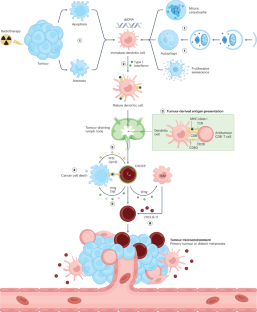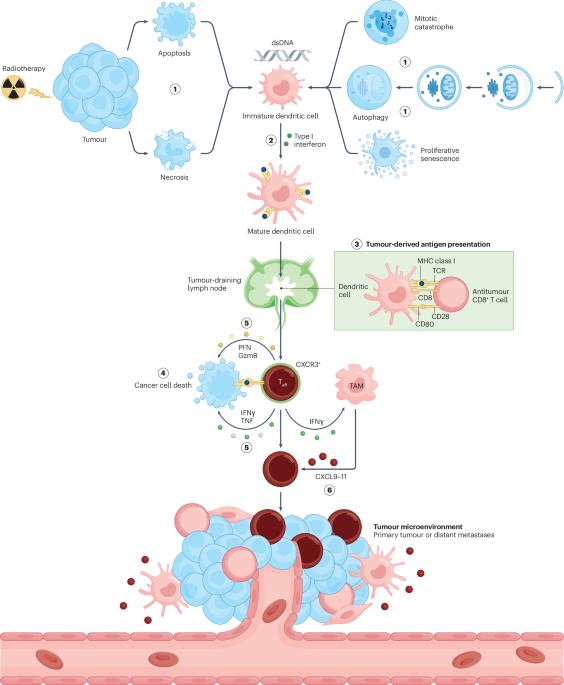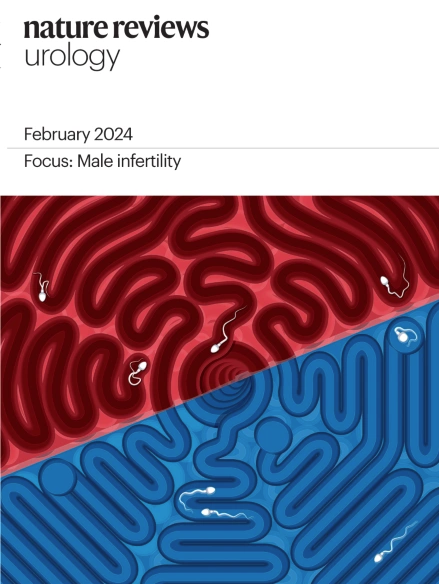高危局部前列腺癌的新辅助卢塞恩 PSMA、TIME 和免疫反应。
IF 12.1
1区 医学
Q1 UROLOGY & NEPHROLOGY
引用次数: 0
摘要
尽管尝试了包括手术在内的局部根治性治疗,但高危局部前列腺癌仍然是一种致命疾病,复发率、转移率和死亡率都很高。疾病复发被认为是局部控制失败和隐匿性微转移的结果。手术前的新辅助治疗策略对许多癌症都有疗效,但迄今为止,还没有一种治疗方法对前列腺癌有效。基于前列腺特异性膜抗原(PSMA)的治疗技术是前列腺癌领域一个令人兴奋且发展迅速的领域。新型静脉放射性核素疗法[177Lu]Lu-PSMA-617(镥PSMA)已被证明能有效治疗转移性阉割耐药前列腺癌患者,靶向全身表达PSMA的细胞。如果在新辅助治疗中使用,镥PSMA还能改善高危局部疾病患者的长期肿瘤治疗效果。放疗的一个组成部分是可能导致癌细胞死亡的免疫原性形式。镥PSMA可导致癌细胞死亡,从而释放肿瘤抗原,诱导肿瘤特异性全身免疫反应。这种放射性配体靶向治疗有可能通过直接靶向表达 PSMA 的细胞来治疗局部和全身肿瘤部位,也可能通过这种全身免疫反应间接发挥作用。在选定的患者中,镥PSMA有可能与全身免疫疗法相结合,以增强抗肿瘤T细胞的反应,这可能会对前列腺癌患者产生持久的免疫力。本文章由计算机程序翻译,如有差异,请以英文原文为准。


Neoadjuvant lutetium PSMA, the TIME and immune response in high-risk localized prostate cancer
High-risk localized prostate cancer remains a lethal disease with high rates of recurrence, metastases and death, despite attempts at curative local treatment including surgery. Disease recurrence is thought to be a result of failure of local control and occult micrometastases. Neoadjuvant strategies before surgery have been effective in many cancers, but, to date, none has worked in this setting for prostate cancer. Prostate-specific membrane antigen (PSMA)-based theranostics is an exciting and rapidly evolving field in prostate cancer. The novel intravenous radionuclide therapy, [177Lu]Lu-PSMA-617 (lutetium PSMA) has been shown to be effective in treating men with metastatic castration-resistant prostate cancer, targeting cells expressing PSMA throughout the body. When given in a neoadjuvant setting, lutetium PSMA might also improve long-term oncological outcomes in men with high-risk localized disease. A component of radiotherapy is potentially an immunogenic form of cancer cell death. Lutetium PSMA could cause cancer cell death, resulting in release of tumour antigens and induction of a tumour-specific systemic immune response. This targeted radioligand treatment has the potential to treat local and systemic tumour sites by directly targeting cells that express PSMA, but might also act indirectly via this systemic immune response. In selected patients, lutetium PSMA could potentially be combined with systemic immunotherapies to augment the antitumour T cell response, and this might produce long-lasting immunity in prostate cancer. Lutetium PSMA is approved for the treatment of advanced prostate cancer and is being studied in a neoadjuvant setting. The influence of lutetium PSMA on the tumour immune microenvironment is unknown. In selected patients, lutetium PSMA could be used as a stand-alone treatment or in combination with immunotherapy to produce long-lasting antitumour immunity.
求助全文
通过发布文献求助,成功后即可免费获取论文全文。
去求助
来源期刊

Nature Reviews Urology
医学-泌尿学与肾脏学
CiteScore
12.50
自引率
2.60%
发文量
123
审稿时长
6-12 weeks
期刊介绍:
Nature Reviews Urology is part of the Nature Reviews portfolio of journals.Nature Reviews' basic, translational and clinical content is written by internationally renowned basic and clinical academics and researchers. This journal targeted readers in the biological and medical sciences, from the postgraduate level upwards, aiming to be accessible to professionals in any biological or medical discipline.
The journal features authoritative In-depth Reviews providing up-to-date information on topics within a field's history and development. Perspectives, News & Views articles, and the Research Highlights section offer topical discussions and opinions, filtering primary research from various medical journals.
Covering a wide range of subjects, including andrology, urologic oncology, and imaging, Nature Reviews provides valuable insights for practitioners, researchers, and academics within urology and related fields.
 求助内容:
求助内容: 应助结果提醒方式:
应助结果提醒方式:


